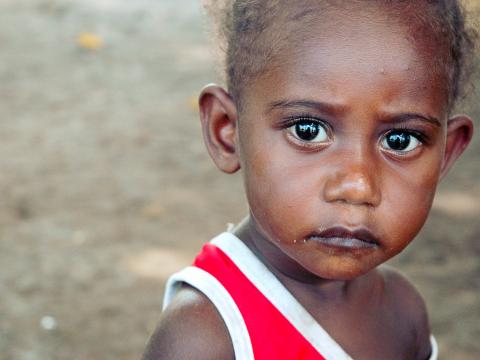The lost generation of Bougainville: women speak up

By: Sabine Elvy
The Autonomous Region of Bougainville, Papua New Guinea, seems like a true paradise: turquoise waters, palm trees and smiling faces. But this area has a troubled past. Civil war waged in Bougainville for nearly 10 years in the 1990s displacing around 70,000 people and killing thousands. Over a decade later, the legacy of the war continues to leave its devastating impacts upon a new generation, including children born post-conflict.
Cecilia Naguo, 44, is a midwife from Buin District who knows that civil war costs more than just lives. Cecilia was 23 years old and had just graduated from nursing college when the civil war started. She runs World Vision’s nutrition project in Bougainville, Good Food to Support the Growth of Children funded by World Vision New Zealand. Children’s health is something that Cecilia is passionate about and she is familiar with the history. She describes a generation of people who missed out on basic health and education during the conflict, labelling them as “the lost generation”.
“During the civil war, children never had any basic health services”, Cecilia says. “It was very difficult to get medical supplies to treat any childhood illness.”
“War also had a huge impact children’s immunisations, because there was simply no way of procuring vaccines. Most children died from preventable diseases.”
Unfortunately, illiteracy and lack of basic education – a legacy of the conflict – is a significant challenge in breaking the cycle of disease and malnutrition, as skills have not been learned and passed on.
Tragically, child health is in a dire state. Children born post-conflict continue to die before they reach their fifth birthday, many deaths due to complications at birth, as well as preventable diseases as such as pneumonia, malaria and diarrhea. This is something that women at the Buka Markets appear to agree upon and are more than happy to speak up about.
Genevieve, 41, is a mother of four and understands too well that lack of awareness - stemming from lack of education - is a big issue that needs addressing in Bougainville. She explains that many children in Bougainville are malnourished and therefore susceptible to falling ill, and she wishes that there were more awareness about children’s health at the community level. “Unplanned pregnancies are a problem here”, she says. “We need to educate our youth. Many do not have the skills required to look after children.”
Gorethy, of South Bougainville, agreed that many children suffer from neglect. What they need, she says, is “love, support and balanced meals”. Genevieve, who is expecting her fifth child, rubs her belly and nods.
“Children should have three balanced meals a day, but they often miss lunch”, adds Jenny, a 28 year old woman from West Coast Bougainville. “Sometimes it’s because of food shortages, but other times women just have too many chores.”
The effects of the conflict are far reaching, but so are the positive effects of educating the future generation to raise healthy, strong and happy children. With the right approach to children’s health, all is not lost.
Learn more about how World Vision is taking action for child health HERE.